Take the First Step For Estimate!
- Accurancy
- Efficiency
- Transparency
- Customization
- Time Saving
- Professionalism
- Cost Control
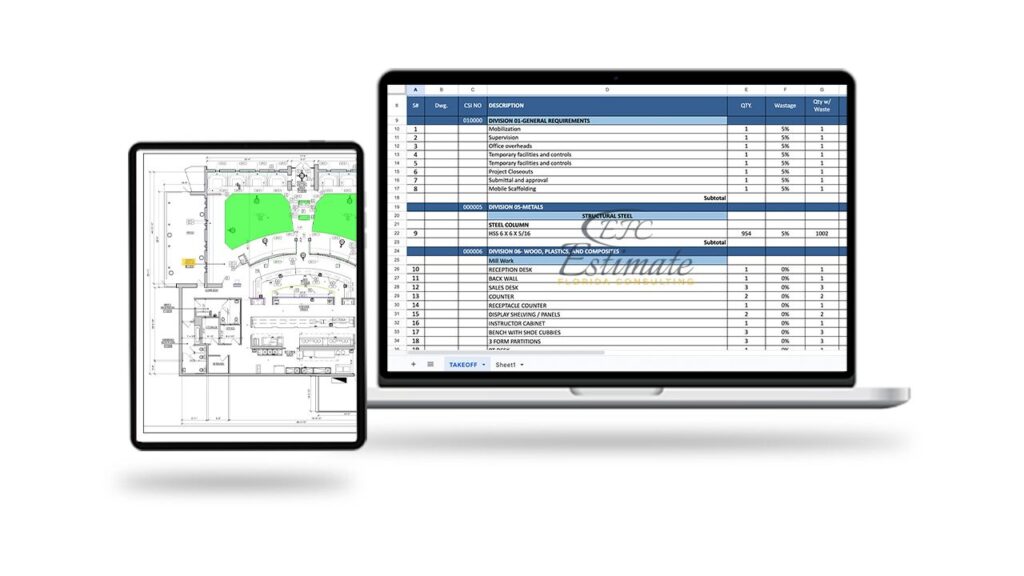
When estimating concrete costs for manufacturing plants in Florida, key financial figures play a pivotal role in planning and budgeting. Curious about the specifics? For concrete foundation installation, expect costs to average around $6.23 per square foot for a 4-inch reinforced slab on grade. If you’re considering a concrete patio, the costs might average $5.73 per square foot for a 4-inch reinforced slab. Sidewalks or walkways are similarly priced, with an average of $6.37 per square foot for a 4-inch reinforced slab. These figures provide a concrete (pun intended) starting point for budgeting your manufacturing plant’s construction.
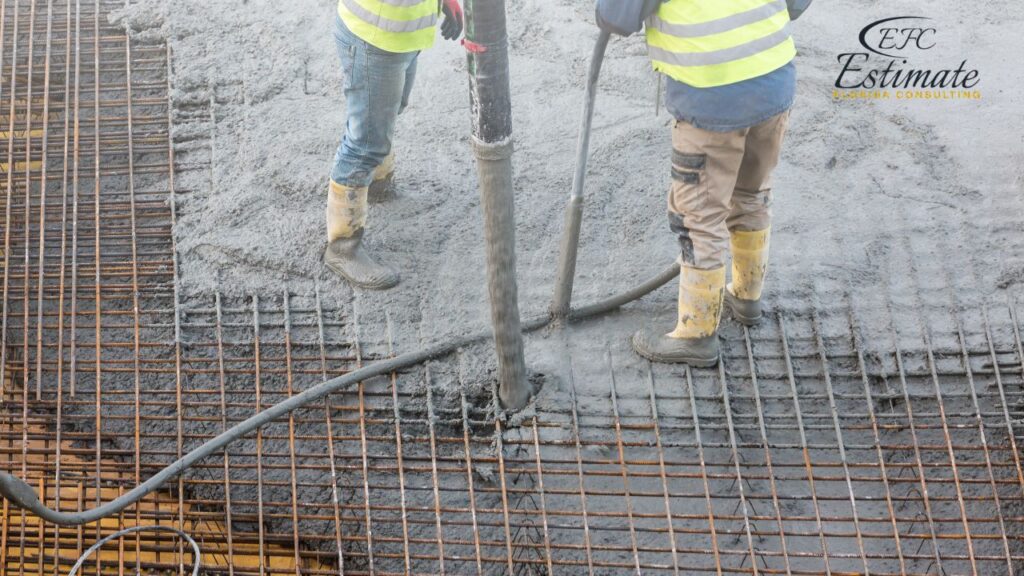
Remember, prices can vary based on the project’s complexity, location within Florida, and the current market rates for materials and labor

Construction Component | Average Cost |
Concrete Foundation Installation | $5.89 – $6.56 per sq ft |
Concrete Patio Installation | $4.90 – $6.56 per sq ft |
Concrete Sidewalk/Walkway Installation | $6.02 – $6.72 per sq ft |
Concrete Slab Leveling (Mudjacking) | $4.61 – $5.65 per sq ft |
Concrete Floor Coating (Solid Epoxy) | $3.31 – $5.15 per sq ft |
Concrete Stamping & Coloring (Simple) | $10.50 – $11.51 per sq ft |
Concrete Sawing, Demolition, Removal | $3.69 – $5.51 per sq ft (4″ slab) |
Concrete Block Wall Installation | $7.75 – $9.64 per sq ft |
Concrete Delivery | $100.17 – $112.15 per cubic yard |
Concrete Pool Deck Installation | $4.54 – $5.79 per sq ft |
Before initiating the concrete cost estimation process, a thorough understanding of the various variables influencing costs is paramount. The type and quality of concrete chosen for the project, coupled with considerations such as labor expenses, equipment rentals, delivery charges, and project size, all contribute significantly to the overall cost. Additionally, local market conditions and the availability of raw materials play a crucial role in determining the pricing structure. By comprehending these variables, estimators can create a more accurate and comprehensive cost projection, laying the foundation for successful project management.
Different manufacturing plant projects necessitate distinct types of concrete, each with its own set of cost implications. Standard concrete, offering a balance of strength and cost-effectiveness, contrasts with high-strength concrete, engineered for specific structural requirements, and specialty mixes tailored to unique project needs. Choosing the right type based on project specifications is a pivotal decision that directly influences the accuracy of the cost estimate, ensuring that the chosen concrete aligns with both performance expectations and budget constraints.
Standard concrete, also known as normal concrete, is the most commonly used type in construction projects. It typically consists of cement, water, aggregates (sand, gravel, or crushed stone), and may include additional additives for improved workability or durability. Standard concrete is suitable for a wide range of manufacturing plant applications, offering a good balance of strength and cost-effectiveness. Its affordability makes it a popular choice for projects where high-strength requirements are not a primary concern.
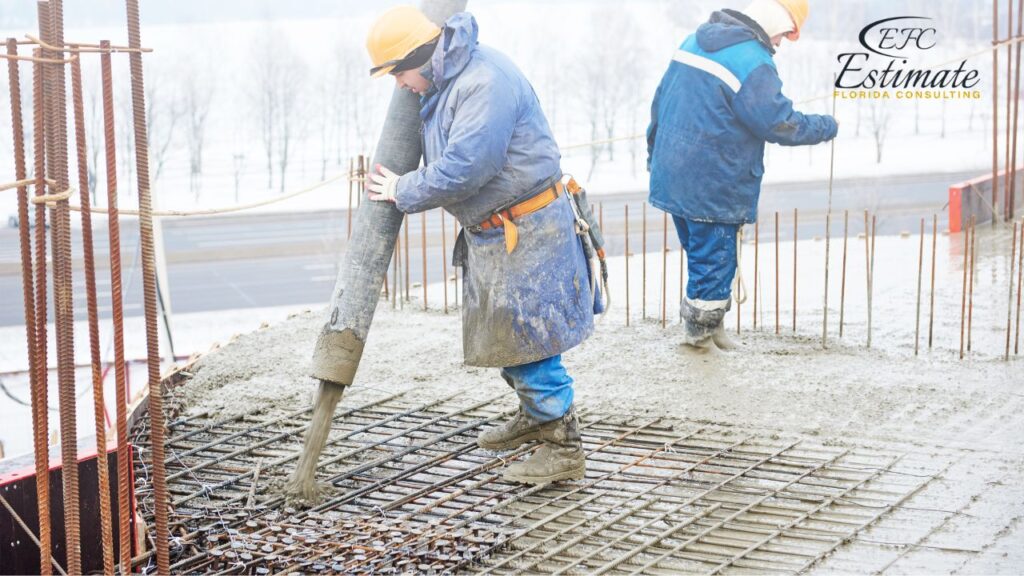
For manufacturing plants with specific structural or load-bearing requirements, high-strength concrete becomes essential. This type of concrete is engineered to achieve compressive strengths significantly higher than that of standard concrete. High-strength concrete often involves a different mix design, incorporating specialized admixtures, finely ground aggregates, and precise proportions of cement. While providing enhanced structural performance, it comes at a higher cost due to the use of premium materials and careful quality control measures during production.
Manufacturing plant projects may demand concrete with unique properties tailored to specific needs. Specialty mixes can include:

ZIP Code Based Estimate
Highly Accurate
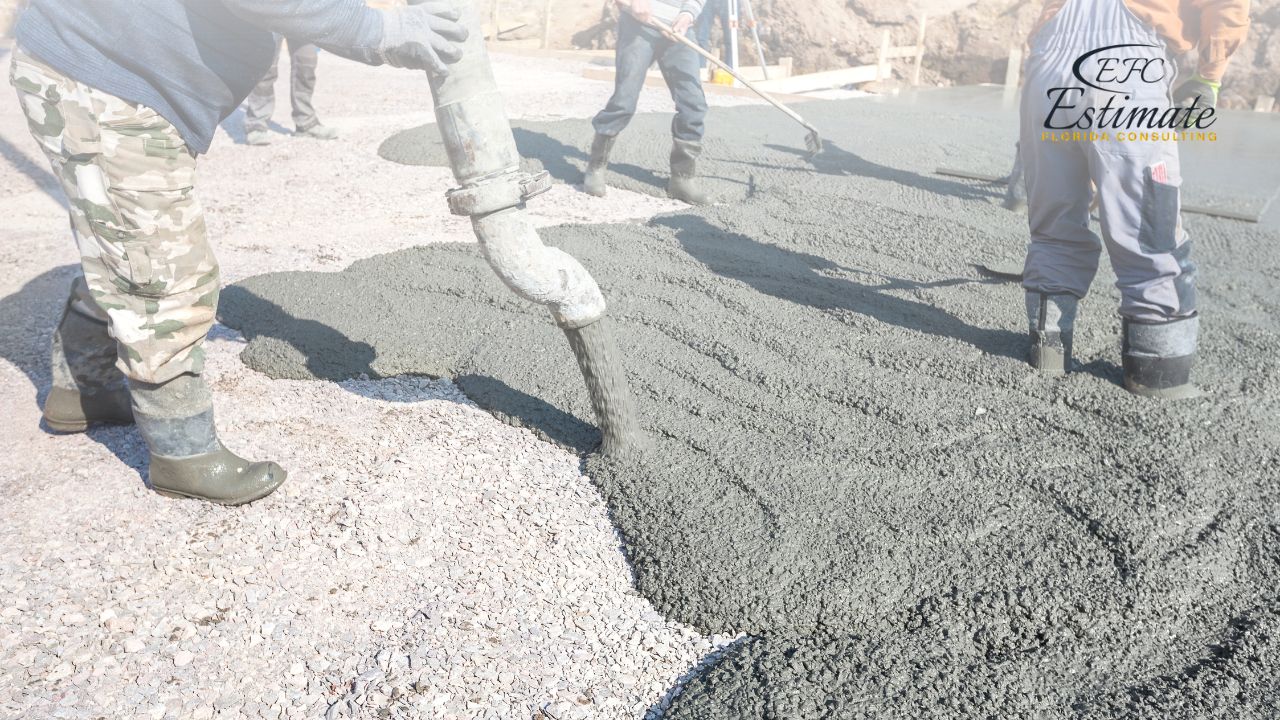
Fully Insured License Hire Hire Sub-Contractor For Manufacturing Plant Concrete Installation
Hire Contractor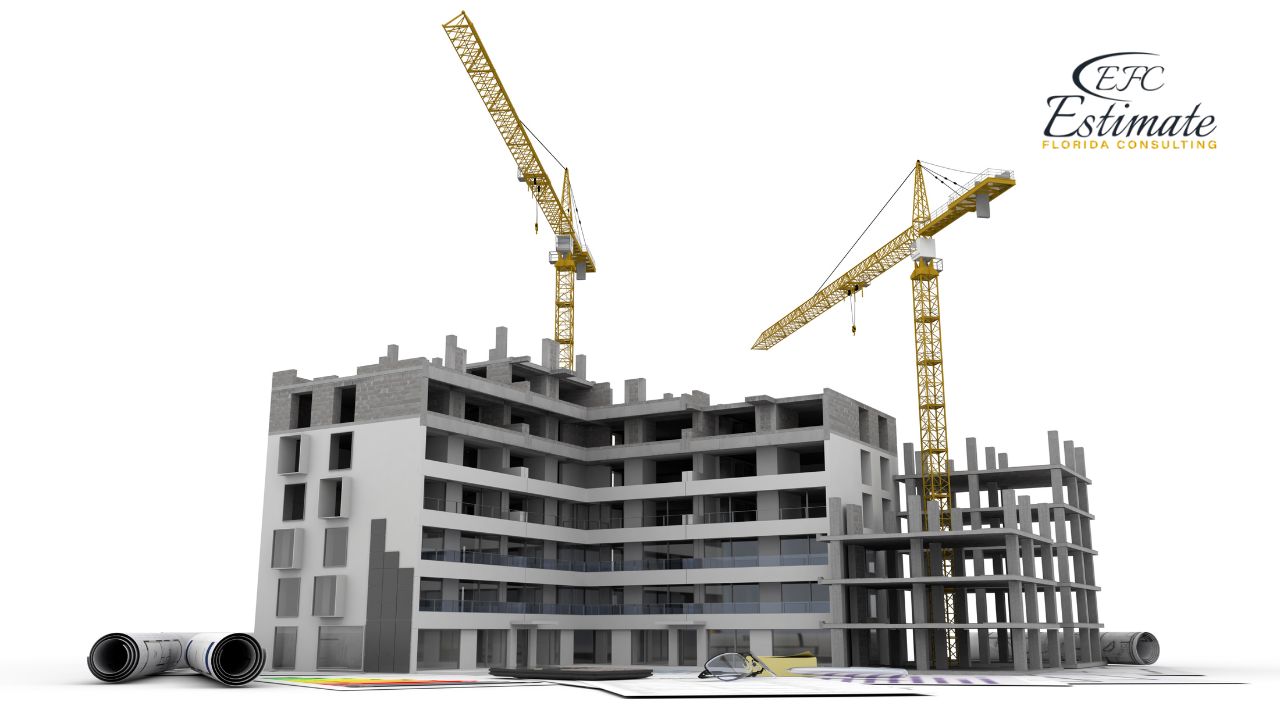
Make Informed Design Decisions Showcase Your Design Ideas
Get RenderingSelecting the appropriate type of concrete is a critical decision that directly influences the project’s success and budget. Factors such as structural requirements, environmental conditions, and budget constraints should be carefully considered. Collaborating with concrete suppliers and consulting with structural engineers can help determine the optimal mix for the specific needs of the manufacturing plant project. While standard concrete may be suitable for many applications, high-strength or specialty mixes may be necessary for projects with more demanding performance criteria. By understanding the characteristics of each type of concrete, project managers can make informed decisions that balance cost-effectiveness with structural integrity.
Service or Material | Cost Range or Average |
Concrete Driveway Installation | $2.00 – $20.00 per sq ft |
Concrete Driveway & Floor Installation (4″) | $11.00 per sq ft |
Concrete Driveway & Floor Installation (6″) | $11.00 per sq ft |
Concrete Driveway & Floor Repair | $4.25 – $9.50 per sq ft |
Concrete Floor Polishing | $3.95 – $4.90 per sq ft |
Concrete Pool Deck Repair (Per Hour) | $52.50 – $67.50 (plus materials) |
Concrete Delivery | $100.17 – $112.15 per cubic yard |
Pool Deck (Concrete) – Repair | $60.00 per hour (plus materials) |
Concrete Patio or Walkway Installation | $2.00 – $20.00 per sq ft |
Labor costs constitute a substantial portion of concrete project expenses. Estimators must carefully evaluate the skill level of laborers, the complexity of the project, and the anticipated duration for completion. Accounting for potential overtime and additional labor-related expenses guarantees a more realistic cost projection. Skilled labor is often required for tasks such as formwork, finishing, and other intricate aspects of concrete construction, making an accurate assessment crucial for budgeting and project planning.
Manufacturing plant projects demand specialized equipment and tools to ensure the proper mixing, placement, and finishing of concrete. Estimators need to factor in costs associated with concrete mixers, pumps, formwork, finishing tools, and any other equipment essential for the job. Rental fees, maintenance costs, and transportation expenses for these items should be included in the estimation, providing a comprehensive overview of the equipment-related expenditures involved in the project.
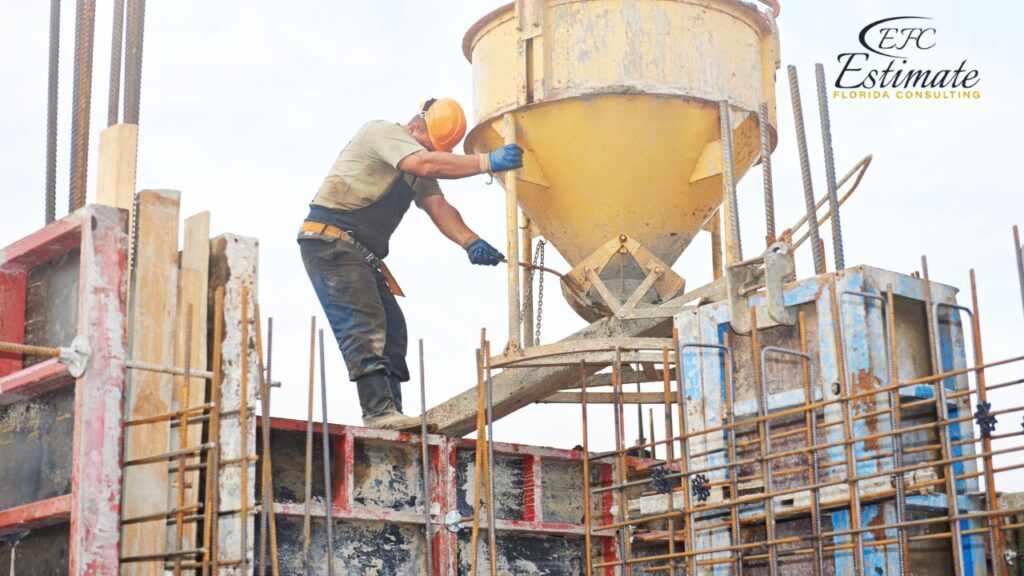
The distance between the concrete batching plant and the manufacturing site significantly influences delivery charges. Estimators must carefully consider transportation costs, particularly if the project is situated in a remote area. Strategic planning of delivery schedules becomes crucial to minimizing these expenses while ensuring that the concrete is delivered efficiently and meets the project timeline.
Concrete projects inherently generate waste, and unforeseen challenges can emerge during construction. Allocating a percentage of the cost estimate for waste and contingency is a prudent approach. This financial buffer ensures that the budget can absorb unexpected expenses, safeguarding the project’s success even in the face of unforeseen circumstances.
Remaining vigilant to local market conditions is essential for accurate cost estimation. Fluctuations in the prices of raw materials, including cement and aggregates, can significantly impact the overall project cost. Regularly updating cost estimates based on market dynamics enables adaptability to changing economic conditions, allowing for more precise budget planning and financial management.
So, why wait? Send us your plans and give us a call now. Let’s make your project a success together!
Embracing technological advancements and innovative construction methods can have a profound impact on project efficiency and cost-effectiveness. Incorporating advanced techniques and materials that enhance durability or expedite construction processes should be considered during the estimation phase. By staying abreast of technological developments, estimators can optimize project costs while ensuring the implementation of cutting-edge practices for enhanced project outcomes.
In the realm of manufacturing plants, where efficiency and cost-effectiveness are paramount, accurate concrete cost estimation proves indispensable. This article explored key factors influencing concrete expenses, from the selection of suitable types such as standard, high-strength, and specialty mixes, to the considerations of labor costs, equipment expenditures, and delivery logistics. Strategic planning for delivery schedules, mitigating waste through contingency buffers, and staying attuned to market dynamics were emphasized as essential components. The integration of technology and innovation, alongside a comprehensive understanding of these variables, empowers project managers to make informed decisions, optimizing costs, and ensuring successful project outcomes in the competitive landscape of manufacturing plant projects.
Understanding the variables influencing costs is crucial, including the type and quality of concrete, labor expenses, equipment rentals, delivery charges, project size, local market conditions, and raw material availability. A comprehensive grasp of these factors is essential for accurate cost projections.
Various concrete types, such as standard, high-strength, and specialty mixes, come with distinct cost implications. Standard concrete offers a balance of strength and cost-effectiveness, while high-strength variants, and specialty mixes tailored to unique project needs, may incur higher costs due to premium materials and specific requirements.
Labor costs constitute a substantial portion of concrete project expenses. Estimators must assess laborers’ skill levels, project complexity, and anticipated duration for completion. Factoring in potential overtime and additional labor-related expenses ensures a more realistic cost projection.
Specialized equipment and tools are crucial for concrete projects in manufacturing plants. Estimators need to consider costs associated with concrete mixers, pumps, formwork, finishing tools, and other equipment. Including rental fees, maintenance costs, and transportation expenses provides a comprehensive overview of equipment-related expenditures.
The distance between the concrete batching plant and the manufacturing site significantly influences delivery charges. Estimators must carefully consider transportation costs, especially in remote areas. Strategic planning of delivery schedules becomes crucial for minimizing expenses and ensuring efficient, timely deliveries.
Remaining vigilant to local market conditions is essential for accurate cost estimation. Fluctuations in raw material prices, such as cement and aggregates, can significantly impact overall project costs. Regularly updating cost estimates based on market dynamics enables adaptability to changing economic conditions, ensuring precise budget planning and financial management.
Here I am going to share some steps to get a manufacturing plant concrete cost estimate report.
You can send us your plan on info@estimatorflorida.com
Before starting your project, we send you a quote for your service. That quote will have detailed information about your project. Here you will get information about the size, difficulty, complexity and bid date when determining pricing.
Our team will takeoff and estimate your project. When we deliver you’ll receive a PDF and an Excel file of your estimate. We can also offer construction lead generation services for the jobs you’d like to pursue further.
561-530-2845
info@estimatorflorida.com
Address
5245 Wiles Rd Apt 3-102 St. Pete Beach, FL 33073 United States
561-530-2845
info@estimatorflorida.com
Address
5245 Wiles Rd Apt 3-102 St. Pete Beach, FL 33073 United States
All copyright © Reserved | Designed By V Marketing Media | Disclaimer